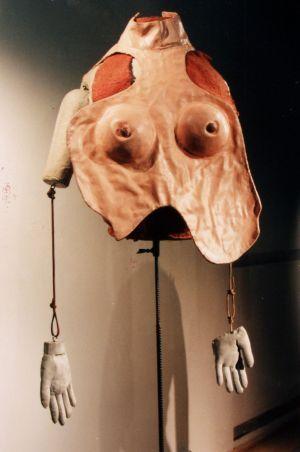Tadeusz Kantor
dal 15/4/2005 al 12/6/2005
Segnalato da
15/4/2005
Tadeusz Kantor
Zacheta National Gallery of Art, Warsaw
Interior of the Imagination

Interior of the Imagination
Curators Marek Swica, Jaroslaw Suchan
The major difference between this exhibition and the vast majority of
previous presentations of the oeuvre of Tadeusz Kantor lies in its
approach to its subject matter. Its goal is not the reconstruction of the
"model" image of the artist's work, as sanctioned by the artist himself,
but an attempt to present his work from the perspective of a contemporary
viewer who has grown up with different cultural experiences and is endowed
with a different visual sensibility. Thus, above and beyond the fact that
the exhibition omits nothing of significance, its key feature is that in
contradistinction to typical monographic exhibitions it does not limit
itself to setting works in their historical context. It is rather an
attempt to interpret the works in a way that enables Kantor's art to be
seen as a phenomenon that is still of very real contemporary significance.
The conception of the exhibition is founded on the conviction that in
Kantor's art, despite the fact that some of his works are deservedly
classed as masterpieces, it is not so much the individual works
themselves, but the idea created by the artist that is of prime
significance. The exhibition does not therefore present the works as
closed artefacts, but demonstrates the way in which they acted above all
as the translation of Kantor's artistic practice.
This attempt to (re)construct Kantor's "interior" is founded on three
concepts that were fundamental to Kantor's art: the avant-garde, reality
and the interior. For it is precisely the presence of these three
elements, interweaving in a many-layered thread of mutual tensions and
dependencies, that creates the remarkable power of his work. The permanent
state of "dynamic imbalance" between them means also that despite the huge
internal differences within Kantor's oeuvre - the passage through the
different stages, the embracing of successive languages and concepts, the
engaging with ever new fields of activity - his art today emerges as an
astoundingly unified whole. The first theatrical undertakings, the
dialogue with the avant-garde, with informel, the "games with Witkacy",
the experiments of the 60's and 70's, the Theatre of Death and even the
final paintings: all of these actions, in many respects so different from
one another, turn out in the context of the triad of concepts mentioned to
all be chapters of the same story. Of a story in which a yearning for an
avant-garde utopia mixes with a fear of its tyranny, and where memory is
both a burden and a liberation from the terror of modernity, while reality
is in its turn a homage made to illusion.
In this year falls the 90th anniversary of Kantor's birth and the 15th of
his death. Thirty years ago saw the premiere of Kantor's most celebrated
play Dead Class.
As part of the exhibition, Kantor's installation The Machine of Love and
Death will be presented in the Kordegarda Gallery.
Honorary Patron of the exhibition is Waldermar Dabrowski, Minister of
Culture of the Republic of Poland, and Janusz Sepiol, Marshall of the
Malapolska Region.
Tadeusz Kantor (1915 Wielopole Skrzynskie - 1990 Krakow)
One of the most outstanding artists of the second half of the 20th
century: painter, drawer, art theoretician, set designer and theatre
director, creator of happenings, theatre reformer and major figure on the
Polish art scene. He studied at the Academy of the Fine Arts in Cracow,
where after the war he was professor on two occasions, on both occasions
also being dismissed from the position. During the occupation he founded
the Underground Theatre, and in 1945 Group of Young Visual Artists. In
1948 he was one of the organisers of the 1st Exhibition of Modern Art in
Cracow, at which he exhibited metaphorical paintings. The inspiration for
these, and for many of his later works, was the latest trends in world
art, with which Kantor became acquainted during his many travels, to New
York and Paris, amongst others. During the period 1950-1954, unable to
reconcile himself with the doctrine of socialist realism, he withdrew from
the official artistic scene. In 1955 in the company of Maria Jarema he
founded the independent theatre, Teatr Cricot 2. In 1957, along with a
group of other artists he reactivated the Cracow Group. He made abstract
informel paintings, before briefly returning to object art with his
emballages. In the 1960's he started to produce plays within the frame of
the Zero and Happening Theatre. Beginning in 1965 he began to collaborate
with the Foksal Gallery in Warsaw, where he held exhibitions and created a
series of artistic actions and happenings. He went on to stage the
multiple award-winning play Dead Class according to the principles of the
Theatre of Death. In the 80's he presented a further series of highly
acclaimed plays: Wielopole, Wielopole, Let the Artists Vanish and I Shall
Never Return Here. During this period he also made a marked return to
figurative art.
Exhibition Organisers
Zacheta National Gallery of Art
Pl. Malachowskiego 3
00-916 Warszawa
http://www.zacheta.art.pl
Director Agnieszka Morawinska
Cricoteka Centre for the Documentation of the Art of Tadeusz Kantor
ul. Szczepanska 2
31-011 Krakow
http://www.cricoteka.com.pl
Director Natalia Zarzecka
Organisation on the Zacheta Side Julia Leopold
Organisation on the Cricoteka Side Natalia Zarzecka, Malgorzata
Paluch-Cybulska
Exhibition Organised with the Financial Support of the Ministry of Culture
of the Republic of Poland



